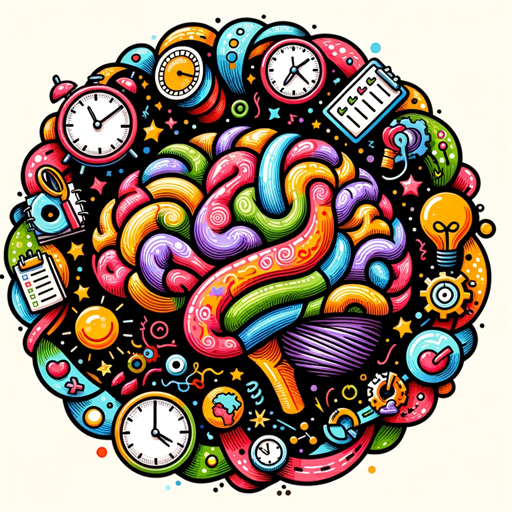ADHD Test-ADHD assessment tool for individuals
AI-powered ADHD symptom screening tool
How do I know if I might have ADHD?
Can you help me understand ADHD symptoms?
I struggle with time management, is that related to ADHD?
What are the next steps after this assessment?
Related Tools
Load More
ADHD Coach
Guiding Your ADHD Journey: Supportive, Practical, Always There: Your ADHD Ally

Tasktacular ADHD Procrastination Helper
This is a voice-based task guidance helper thats meant to help deal with procrastination and ADHD.

ADHD Companion
Guiding users with ADHD towards better self-management

Autism , ADHD, Neurodiversity Glassbox Fitness
Developed on proprietary GFN PT3 Techniques, offers empirical insights into fitness for Autism Spectrum Levels 1-3, ADHD, PTSD, Down syndrome, other forms of neurodivergence. A unique resource for fitness professionals, educators, parents and support work

ADHD Assistant
Friendly, curious, and clear; excels in structured, detailed explanations.

ADHD Buddy
I'm a multilingual ADHD friend - Feel free to chat with me :-)
20.0 / 5 (200 votes)
Introduction to ADHD Test
ADHD Test is designed to provide a structured and comprehensive assessment for individuals who suspect they may have Attention Deficit Hyperactivity Disorder (ADHD). Its primary function is to guide users through a detailed, evidence-based questionnaire that captures the full spectrum of ADHD symptoms, including attention difficulties, impulsivity, hyperactivity, and executive functioning issues like time management and organization. The goal is to offer preliminary insights into whether a user’s experiences may align with ADHD, while also encouraging professional evaluation. For example, if a user struggles with consistently finishing tasks at work and finds themselves easily distracted, the test can help identify patterns of inattentiveness and impulsive behaviors, providing feedback on whether these issues are commonly associated with ADHD.

Main Functions of ADHD Test
Comprehensive ADHD Symptom Questionnaire
Example
A user works in a high-paced environment and finds they often miss deadlines because they get easily distracted by social media or emails. By answering questions related to time management, distraction, and task initiation, they can better understand whether their experiences are indicative of ADHD.
Scenario
In a workplace scenario, a user answers a series of questions regarding their ability to focus, stay organized, and complete projects. The assessment highlights difficulties in these areas, suggesting a possible connection to ADHD symptoms.
Pattern Recognition and Symptom Analysis
Example
A student finds it hard to concentrate during lectures, often zoning out or focusing on irrelevant details. After completing the questionnaire, the analysis reveals a pattern of attention difficulties that could be linked to ADHD.
Scenario
In an academic setting, a user answers questions about their attentiveness in class, their ability to take notes, and their tendency to forget assignments. The test recognizes a pattern of forgetfulness and inattentiveness, which may suggest ADHD-related challenges in a learning environment.
Preliminary Diagnostic Insight and Professional Recommendations
Example
An individual constantly feels overwhelmed with daily responsibilities at home, often missing appointments or forgetting essential tasks. The test provides preliminary insight that their symptoms are consistent with ADHD, prompting them to seek a formal evaluation from a healthcare provider.
Scenario
In a home and personal life setting, the test user might realize they often lose track of time and struggle to manage household tasks. After completing the questionnaire, they receive feedback suggesting that their symptoms might align with ADHD, along with advice to consult a specialist.
Ideal Users of ADHD Test
Adults Suspecting ADHD
Adults who notice difficulties in managing their work, home, or social responsibilities—such as struggling with time management, easily becoming distracted, or having trouble finishing tasks—are ideal users. These individuals may have experienced symptoms since childhood but never pursued formal diagnosis. By using the test, they gain insight into how their behaviors may align with ADHD and can use this as a stepping stone for professional help.
Students with Academic Challenges
Students, particularly those in high school or university, who face consistent difficulties with focus, organization, and completing assignments could benefit from this test. These individuals may experience frustration with their academic performance and not understand why they struggle to keep up with their peers. ADHD Test helps these users identify whether their challenges could be related to ADHD and guides them toward seeking appropriate educational support.

Steps to Use ADHD Test
1
Visit aichatonline.org for a free trial without login, no need for ChatGPT Plus to start.
2
Navigate to the ADHD Test section on the website. You’ll find a guided assessment questionnaire that covers key areas such as attention difficulties, impulsivity, and emotional regulation.
3
Answer the questions based on your experiences in different environments (e.g., work, school, home). Make sure to take your time to reflect on your daily challenges.
4
Submit your responses to receive an immediate preliminary analysis of your symptoms. This assessment will help identify if your patterns align with common ADHD traits.
5
Review the provided recommendations and next steps. You will receive advice on pursuing a formal evaluation with a healthcare professional, along with strategies to manage symptoms.
Try other advanced and practical GPTs
Olivia - Your AI Therapist
AI-powered support for your emotional well-being.

#1 Motivation Letter Writer
Effortless AI-Powered Motivation Letters

Storyboard Artist
AI-Powered Storyboard Image Generator

WebSearch Pro
Discover Accurate Information with AI

Skippy
AI-powered answers with an attitude.

SMART Goal Setter
AI-powered tool for goal setting and tracking

AutoGPT
Your AI-powered task automation tool.

CA Employment Lawyer GPT
AI-powered insights for CA employment law

Azure Cloud Expert
AI-powered Azure expertise at your fingertips

lingvocio
AI-powered language assistant for flawless writing

Statistic Teacher
AI-powered insights for statistical problems

一分钟脱口秀
AI-powered comedy script generator

- Symptom Analysis
- Self-Assessment
- Preliminary Screening
- Focus Issues
- Daily Struggles
ADHD Test: Common Questions and Answers
What is the purpose of the ADHD Test?
The ADHD Test provides a preliminary assessment of symptoms commonly associated with ADHD, such as inattention, hyperactivity, and impulsivity. It’s designed to guide users in understanding whether their challenges may align with ADHD traits and help them pursue further evaluation.
Is the ADHD Test a formal diagnostic tool?
No, the ADHD Test offers a preliminary analysis based on self-reported symptoms. It is not a replacement for a professional diagnosis, which requires a clinical interview and may involve neuropsychological testing by a licensed healthcare provider.
What kind of questions can I expect in the ADHD Test?
The test includes questions about your attention span, time management, organizational skills, impulsivity, and emotional regulation in various settings such as work, school, and social situations. These help identify patterns consistent with ADHD.
Who should consider taking the ADHD Test?
Anyone who struggles with consistent focus, time management, impulsive behavior, or emotional regulation might benefit from the test, especially if these challenges interfere with daily life. It’s suitable for adults and teenagers alike who suspect they may have ADHD.
How accurate is the ADHD Test?
While the ADHD Test is based on validated symptom criteria, it’s only a preliminary tool. Its accuracy depends on the honesty and thoroughness of your responses. A professional evaluation is necessary for an accurate diagnosis.